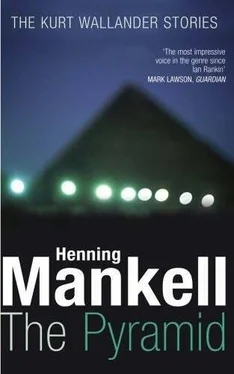Wallander lingered at the table.
'Execution-style,' he said. 'Not particularly Swedish.'
'And what is Swedish, exactly?' Rydberg asked. 'There are no longer any borders. Not for aeroplanes nor serious criminals. Once Ystad lay at the outskirts of something. What happened in Stockholm did not happen here. Not even things that occurred in Malmö were typical in a small town like Ystad. But that time is over.'
'What happens now?'
'The new era will need a different kind of police, particularly out in the field,' Rydberg said. 'But there will still be a need for those like you and me, the ones who can think.'
They walked together along the corridor. Rydberg walked slowly. They parted outside Rydberg's door.
'One o'clock,' Rydberg said. 'The double murder of two old ladies. Is that what we should call this? The case of the little old ladies?'
'I don't like it,' Wallander said. 'I don't understand why anyone would shoot two honourable old ladies.'
'That may be where we have to begin,' Rydberg said thoughtfully. 'By examining if they were actually as honourable as everyone appears to believe.'
Wallander was taken aback.
'What are you insinuating?'
'Nothing,' Rydberg said, and smiled suddenly. 'It's possible that one sometimes draws conclusions too quickly.'
Wallander stood by the window in his office and absent-mindedly watched some pigeons flapping around the water tower. Rydberg is right, he thought. As usual. If there are no witnesses, if we don't get any observations from outside, then this is where we have to start: who were they really, Anna and Emilia?
They were all assembled in the conference room at one o'clock. Hansson had tried to get hold of Björk, without success. But Per Åkeson was there.
Wallander gave an account of the discovery that the two women had been shot. A sombre mood spread through the room. Evidently everyone had been to the sewing shop at least once. Then Wallander turned to Nyberg.
'We're still digging around in the rubble,' Nyberg said. 'But so far we haven't found anything of interest.'
'The cause of the fire?' Wallander asked.
'It's too early to tell,' he replied. 'But according to the neighbours there was a loud blast. Someone described it as a muted explosion. And then, within the span of a minute, the whole building was on fire.'
Wallander looked around the table.
'Since there is no immediately apparent motive, we have to begin by finding out what we can about these sisters. Is it true, as I believe, that they didn't have any relatives? Both were single. Had they ever been married? How old were they? I thought of them as old ladies already when I moved here.'
Svedberg answered that he was sure that Anna and Emilia had never been married, and that they had no children. But he would find out more in greater detail.
'Bank accounts,' said Rydberg, who had not said anything until then. 'Did they have money? Either stuffed under the mattress at home or at the bank. There are rumours about such things. Can that have been the reason for the murder?'
'That doesn't explain the execution-style method,' Wallander said. 'But we need to find out about this. We need to know.'
They divvied up the usual tasks among themselves. They were the same methodical and time-consuming tasks that had to be performed at the beginning of every investigation. When it was a quarter past two, Wallander had only one more thing to say.
'We need to speak to the media,' he said. 'This will interest them. Björk should be present, of course. But I would be happy to get out of it.'
To everyone's surprise, Rydberg offered to speak to the reporters. Normally he was as reticent as Wallander on such occasions.
They broke up. Nyberg returned to the fire scene. Wallander and Rydberg stayed behind for a moment.
'I think we have to place some hope in the public,' Rydberg said. 'More than usual. It's clear that there must have been a motive for killing these sisters. And I have trouble thinking it could have been anything other than money.'
'We've encountered this before,' Wallander said. 'People who don't own a penny but who get attacked because there are rumours of wealth.'
'I have some contacts,' Rydberg said. 'I'll do a little investigating on the side.'
They left the room.
'Why did you take on the press conference?' Wallander asked.
'So that you wouldn't have to do it for once,' Rydberg said and went to his office.
Wallander managed to reach Björk, who was at home with a migraine.
'We're planning a press conference at five o'clock today,' Wallander said. 'We're all hoping you can be there.'
'I'll be there,' Björk said. 'Migraine or not.'
The investigative machine had been set in motion, slow but thorough. Wallander went back to the scene of the fire once more and talked to Nyberg, who was up to his knees in rubble. Then he returned to the station. But when the press conference started, he stayed away. He arrived home around six o'clock. This time his father answered when Wallander called.
'I've already packed,' his father said.
'I should hope so,' Wallander said. 'I'll be there at half past six. Don't forget your passport and tickets.'
Wallander spent the rest of the evening consolidating what they knew of the previous evening's events. He called Nyberg at home and asked him how the work was going.
Slowly, Nyberg said. They would continue in the morning as soon as it was light. Wallander also called the station and asked the officer on duty if any information had come in. But there was nothing that he considered noteworthy.
Wallander went to bed at midnight. In order to be sure of waking on time in the morning, he ordered a telephone wake-up call.
He had trouble falling asleep even though he was very tired.
The thought of the two sisters who had been executed worried him.
Before he fell asleep at last, he had managed to convince himself that it would be a long and difficult investigation. If they did not have the good fortune of tripping over the answer at the very beginning.
The following day he got up at five. At exactly half past six he turned into the driveway in Löderup.
His father was sitting outside on his suitcase, waiting.
They drove to Malmö in darkness. The daily commute from the Skåne region into Malmö had not yet begun in earnest. His father was wearing a suit and a strange-looking pith helmet. Wallander had never seen it before and imagined that his father must have picked it up at a flea market or a second-hand shop. But he said nothing. He didn't even ask if his father had remembered to bring his tickets or his passport.
'You're really going' was all he said.
'Yes,' his father replied. 'This is the day.'
Wallander could sense that his father did not want to talk. It gave him the opportunity to focus on his driving and lose himself in his own thoughts. He was worried about the recent developments in Ystad. Wallander tried to get a handle on it. Why someone would cold-bloodedly shoot two old ladies in the back of the head. But he drew a blank. There was no context, no explanation. Only these brutal and incomprehensible executions.
As they turned into the small car park by the ferry terminal, they saw Linda already waiting outside. Wallander noticed that he didn't like how she greeted her grandfather first, then her father. She commented on her grandfather's pith helmet, saying she thought it suited him.
'I wish I had as nice a hat to show off,' Wallander said as he hugged his daughter. To his relief she was wearing a remarkably ordinary outfit. The opposite was often the case, which always bothered him. Now it struck him that this habit was something that she may have inherited from her grandfather. Or he'd been an influence, at least.
Читать дальше












